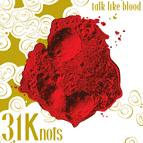On their fourth full-length release — and the first full-length with Polyvinyl Records, Portland's prodigious 31 Knots takes a small step to the side of standard rock form and launches full-speed ahead into something new and interesting. They tread that thin tight rope between excessively rehearsed and completely unhinged rock and roll.
The vocals are sung as controlled tenor sirens; the songs are sometimes epic, reaching arms ("City of Dust") and other times jabbing muscular punches ("Chain Reaction"). As a package, Talk Like Blood is an eccentric, tireless journey conjuring the range in style and class the Stooge's debut exemplifies, while at the same time succeeding where all art strives to succeed by making something new.
Having strayed slightly away from their earlier, more — dare I say, "normal"? — style with The Curse of the Longest Day EP (and the wonderful track "Welcome to Stop") 31 Knots' delivery of a very fine full-length is indeed wonderful as well.
The record begins with a hype-man declaration on "City of Dust," declaring the record "dedicated to the messengers of the left coast," while offering the listener a sound of electric static, like a thunderstorm on a tin roof. Melody and vocals circle around and around arpeggiotic keyboards, building slowly into a guitar entrance, perfectly, over three minutes into the track.
"City of Dust" never leaves the realm of "intro," and the proper beginning of the record is at track two, "Hearsay." Drum rolls and vocals start it, before a funk-driven bassline joins a mudslinging guitar, counterpointing one another.
But the guitar riff and powerful delivery of the track "Chain Reaction" owns the record. At the fifth track, it's the moment where the record kicks into full gear and takes off. Almost as though it's a live show and the band's just been warming up for the first four songs, when "Chain Reaction" hits, it seems the world is little beyond guitar chords and cymbal crashes. Tapping foots will crash through floors all over the world once the guitar solo ends and the punching verse chords come back. For so little instrumentation in the song, it somehow is overflowing with energy.
The record, overall, is nothing if it is not energetic, dirty, interesting, accomplished. In basketball it is often said, "It takes a good shooter to miss," and the raw "garage-rock" appeal striven for by power-chording high schoolers everywhere is made operatic and confirmed in this Portland band. Playing the Paradox on Saturday. Check them out.
